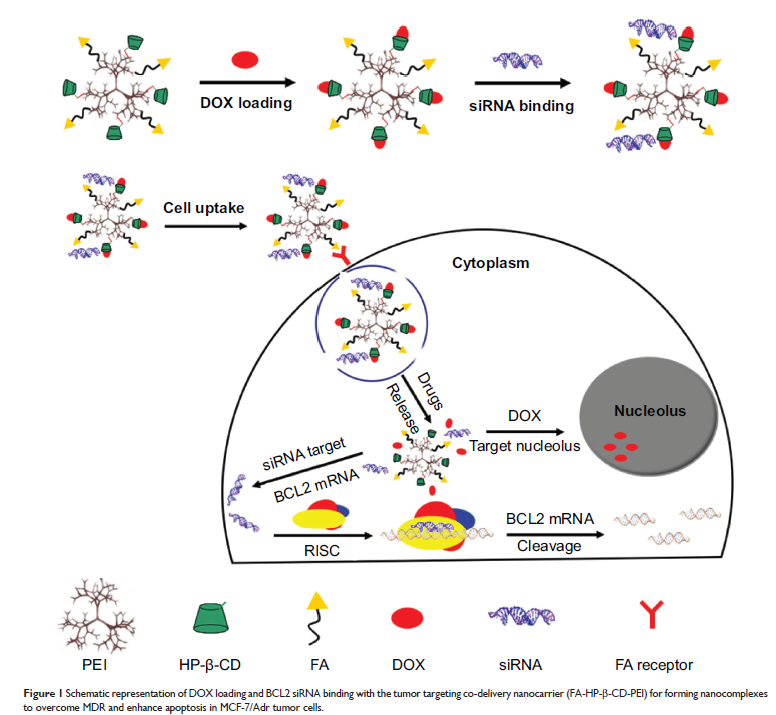109669
论文已发表
注册即可获取德孚的最新动态
IF 收录期刊
- 3.4 Breast Cancer (Dove Med Press)
- 3.2 Clin Epidemiol
- 2.6 Cancer Manag Res
- 2.9 Infect Drug Resist
- 3.7 Clin Interv Aging
- 5.1 Drug Des Dev Ther
- 3.1 Int J Chronic Obstr
- 6.6 Int J Nanomed
- 2.6 Int J Women's Health
- 2.9 Neuropsych Dis Treat
- 2.8 OncoTargets Ther
- 2.0 Patient Prefer Adher
- 2.2 Ther Clin Risk Manag
- 2.5 J Pain Res
- 3.0 Diabet Metab Synd Ob
- 3.2 Psychol Res Behav Ma
- 3.4 Nat Sci Sleep
- 1.8 Pharmgenomics Pers Med
- 2.0 Risk Manag Healthc Policy
- 4.1 J Inflamm Res
- 2.0 Int J Gen Med
- 3.4 J Hepatocell Carcinoma
- 3.0 J Asthma Allergy
- 2.2 Clin Cosmet Investig Dermatol
- 2.4 J Multidiscip Healthc

已发表论文
通过使用叶酸-聚乙烯亚胺共聚物羟丙基-β-环糊精 (cyclodextrin) 同时递送阿霉素 (doxorubicin) 和 Bcl-2 的 siRNA,使 MCF-7/ADR 细胞的发生多药耐药性逆转
Authors Li JM, Zhang W, Su H, Wang YY, Tan CP, Ji LN, Mao ZW
Published Date April 2015 Volume 2015:10 Pages 3147—3162
DOI http://dx.doi.org/10.2147/IJN.S67146
Received 2 May 2014, Accepted 9 June 2014, Published 23 April 2015
Abstract: Systemic administration of chemotherapy for cancer often faces drug
resistance, limiting its applications in cancer therapy. In this study, we
developed a simple multifunctional nanocarrier based on polyethylenimine (PEI)
to codeliver doxorubicin (DOX) and BCL2 small interfering RNA (siRNA) for
overcoming multidrug resistance (MDR) and enhancing apoptosis in MCF-7/Adr
cancer cells by combining chemotherapy and RNA interference (RNAi) therapy. The
low-molecular-weight branch PEI was used to conjugate hydroxypropyl-β-cyclodextrin
(HP-β-CD) and folic acid (FA), forming the codelivery nanocarrier
(FA-HP-β-CD-PEI) to encapsulate DOX with the cavity HP-β-CD and bind siRNA with
the positive charge of PEI for tumor-targeting codelivering drugs. The
drug-loaded nanocomplexes (FA-HP-β-CD-PEI/DOX/siRNA) showed uniform size
distribution, high cellular uptake, and significant gene suppression of BCL2,
displaying the potential of overcoming MDR for enhancing the effect of
anticancer drugs. Furthermore, the nanocomplexes achieved significant cell
apoptosis through a mechanism of downregulating the antiapoptotic protein BCL2,
resulted in improving therapeutic efficacy of the coadministered DOX by tumor
targeting and RNA interference. Our study indicated that combined RNAi therapy
and chemotherapy using our functional codelivery nanocarrier could overcome MDR
and enhance apoptosis in MDR cancer cells for a potential application in
treating MDR cancers.
Keywords: tumor targeting, codelivery, doxorubicin, BCL2 siRNA, overcome multidrug resistance
Keywords: tumor targeting, codelivery, doxorubicin, BCL2 siRNA, overcome multidrug resistance
